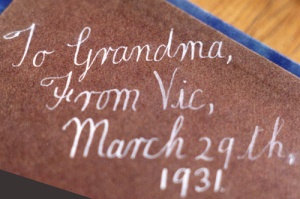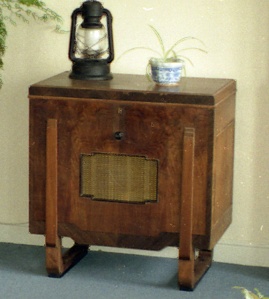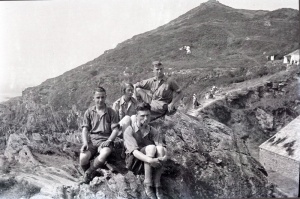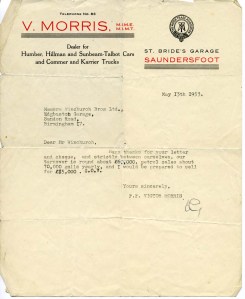Francis Victor Winchurch, (known for most of his life as ‘Vic’), was born on 5 February 1914 at 12, Waterloo Road, Smethwick Birmingham.
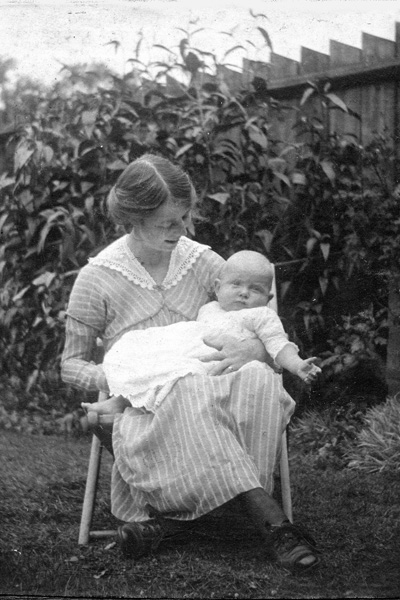
Spring 1914
Pictured here with Marion in the garden of Pargeter Road, as the horror that became the First World War began in the summer of 1914.
He was the first child of Percy Walter Winchurch, an established garage proprietor and Marion (nee Brown), who had owned her own millinery business in Birmingham. The family lived in Pargeter Road in Smethwick, within walking distance of what Marion always referred to as ‘the Place’ – Winchurch Brothers Motors, in Sandon Road.
The business had been established in 1905, by Percy and Roland, his younger brother, in Ladypool Road, Moseley and moved to new premises in Bearwood around 1912. By the time Vic was born, the business was thriving and both Percy and Roland seem to have prospered during the war years. One episode of note is that Percy appeared at Kings Heath Police Court on 21 November 1916 charged with ‘not obscuring headlights’ on 29 October 1916, for which he was fined 10 shillings. This was, of course at the height of the Great War, but how much real risk ‘not obscuring headlights’ caused is a matter of speculation !
Percy and his family seem to have managed to have some leisure time during the war. Vic is pictured here on the beach (possibly Weston Super Mare) with his maternal grandfather, Henry Ambrose Brown
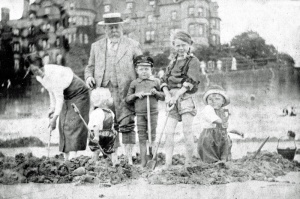
I do not recall which school Vic attended up to the age of eleven but from that age he was educated at King Edward the Sixth Grammar School, Five Ways, Birmingham. He was not happy with his primary education, which I do know was in the private rather than state sector. This experience was, at least partly, the reason behind both my brother David and myself being entirely state educated.
Winchurch Brothers Limited played an important role in all our lives, especially my father’s.
Vic’s sister Jeanne Marion Winchurch arrived in the world in 1919, the year after the armistice and became an adored member of the family from the beginning.
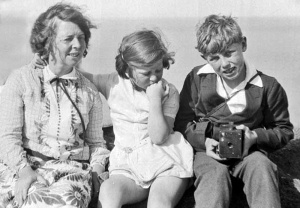
Torquay 1925
(click to enlarge)
Here she is with Vic and their mother around 1925 at Torquay, when Jeanne was seven and Vic twelve.
In the nineteen twenties and thirties Percy, Marion, Vic and Jeanne, often accompanied by Marion’s mother, Alice Brown, travelled frequently to Devon and Cornwall.
Vic became a keen photographer, developing and printing his own photographs. This is the inscription in album made for his grandmother Alice in 1931, mostly containing photos from a previous summer’s visit to Cornwall.
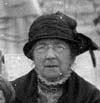
Vic left school at sixteen, in 1930 and trained as a Weights and Measures Inspector (now known as a Trading Standards Officer) with Smethwick Borough Council. I know from conversations with him in later life that his heart was never in that job. He had inherited a love of music, particularly musicals and opera from Marion’s side of the family and perhaps something closer to that interest would have suited him better.
I do know that Percy had misgivings about his abilities, both in practical and managerial roles, with particular regard to a future in Winchurch brothers. A letter from Roland to Percy in 1935 makes this clear :
On 24th March 1936 Roland writes:
” I understand that you have no wish for either your son or my son to take any part in the business with the view to carrying on after we are both deceased”
A fairly chilling remark, which was not refuted in Percy’s reply.
His growing interest in music led to the beginnings of a record collection, first seventy eights, then vinyl and lastly CDs and DVDs towards the end of his life.
In 1935 he became the proud owner of a Marconi Radiogram, a twenty first birthday present from Percy and Marion. This had a rather chequered life in terms of reliability, but played no small part in my own future interest in sound reproduction and electronics, not to mention music and opera.
Vic also bought book and record cabinets made by Minty of Oxford. I still have some of these, along with the cabinet from the Radiogram, but, alas the working parts from the latter were scrapped many years ago !
Undoubtedly, one of the additional attractions of record browsing was the fact that the local music shop in Smethwick belonged to the Woodhouse family. Record sleeves with the Woodhouse name printed on them were common in his collection. Mr and Mrs Woodhouse had three attractive daughters, Mabel, Nina and Dora, plus a son, Ken. That Vic found Nina particularly appealing was frequently alluded to in later years by Margaret, my mother, who also happened to be Nina’s childhood friend from the age of five. One of Vic’s colleagues, also a personal friend, was a young man named Harold Chidlow. Harold seems to have won the race for Nina’s affections, because they were married in 1940.
Vic was a keen cyclist and went out on solo and group outings.
Here he is at Polperro, on a tour of Devon and Cornwall in the early 1930’s. Vic is at the top of the group and I believe his companions were from Smethwick Council, but cannot put names to other faces.
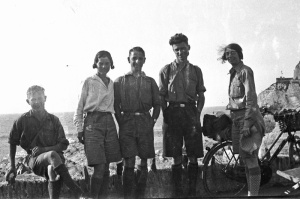
In October 1938 Vic left Smethwick to work in Northallerton as an Additional Inspector of Weights and measures for North Riding of Yorkshire Council. He was there when war broke out in September 1939, but left in December 1940 to move back to his parents’ home.
To quote from a letter of application to Buckinghamshire County Council dated 30 January 1941
“I resigned voluntarily owing to unsatisfactory service conditions”.
Now my father was generally a tolerant, loyal and uncomplaining man, so I can only conclude that things in Northallerton must have been really bad for him to leave and return south without a job!
In the same letter and in a similar letter of application to Dorset he notes that he is “twenty seven and single…I am of course liable for military service, but as far as I can ascertain it is not likely that I shall be called up for some time to come….”
Within two weeks of writing this he was married and had joined the Royal Navy !
Vic Winchurch married Margaret Downing, who worked as a typist for the engineering firm Bellis and Morcom in Birmingham on 8 February 1941.
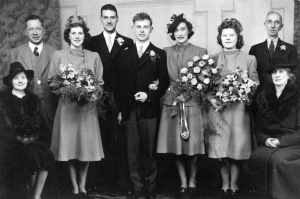
I think that it is fair to say that up to this point in his life Vic had had a fairly privileged and easy life. He bought a motor boat in the late 1930s which was moored on the River Severn at Stourport, but seems to have lost interest and abandoned it.
His next experience of life afloat was very much harder and character forming though.
Vic quickly gravitated to the newly developed technology known as Radar. He became a Radar Petty Officer by the end of the Second World War , serving on, amongst others, a converted merchant ship, HMS Maplin and the battle ship HMS Valiant on convoy duties to South Africa. One of his best friends and a colleague at Smethwick, Den Brotheridge, was the first Allied serviceman to die in the D day landings.
In the middle of that war, on 27 September 1942, I was born in South Road Smethwick, the elder of Vic and Margaret’s two sons. David followed shortly after Vic was ‘demobbed’, born on 13 December 1946 in Handsworth.
Vic had, of course, seen very little of me during the first three years of my life and my memory is that he was hesitant and had trouble dealing with a young son.
For my part, I had undoubtedly grown up surrounded by adoring grandparents, who to a large extent had taken over the role of my father. Taking into account the hardships and deprivations of the war and post war years, I was probably a difficult and rather spoilt child.
I think the immediate post war period was extremely difficult for both Vic and Margaret.
Perhaps despite Percy’s misgivings, Vic was given various jobs at Winchurch Brothers. I remember him mostly serving petrol and acting as storeman. He certainly didn’t take on any managerial role as far as I am aware.
We moved into a house in Handsworth in 1946, in Thornhill Road, to be precise. Number 97 had been owned by a Miss Allday with whom my mother had worked, appropriately enough at Margaret Street Library in the centre of Birmingham.
Unusually for the location and time, the house had central heating, a gravity system powered by a coke guzzling stove in the kitchen.
It also had a strange electricity supply, It was a DC (Direct Current) system which survived in parts of Birmingham into the post war years. It meant that many household appliances, including the treasured radiogram, could not be used at Thornhill Road.
In the summer of 1949 Jeanne took her own life, after discovering that Peter, the former German prisoner of war who she had met and planned to marry, had secretly married another girl in Germany . This devastating event had repercussions for the whole of Vic’s family for many years to come.
Very soon afterwards the decision was made to leave Handsworth. Margaret hated the house and the area, so it was with a feeling of relief all round that we moved twelve miles out of Birmingham to West Hagley in Worcestershire in the summer of 1950.
Vic commuted to and from work at Winchurch Motors using the company van, painted in bright green livery. I remember travelling with Dad along the ‘Hagley Mile’ dual carriageway that dropped the A456 from the plateau upon which Birmingham was built to the lower, softer fields to the west. On one particular occasion, when I was a passenger, he persuaded the Austin A40 van to hit the dizzy speed of sixty miles per hour !
Percy was now making plans for at least a partial retirement. I believe that previous ideas of a move to Devon, or more likely Cornwall, were abandoned because of so many poignant memories of holidays there with Jeanne. Percy turned to another county that he had visited briefly with Marion, just before the war began in 1939.
Pembrokeshire.
The emerging plan in 1950 was that Percy would sell his share of Winchurch Brothers and buy out or go into partnership with Vic Morris proprietor of St Brides Garage in Saundersfoot.
Vic was to be involved in a new venture building small boats to meet the demands of a growing leisure activity and carry the family forward into the second half of the twentieth century.
With characteristic drive and commitment, Percy bought a small caravan to act as a base in Pembrokeshire whilst preparations for a permanent move were under way.
The Coronation of 1953 seemed to be an omen of new beginnings, but three months later everything changed
Percy Winchurch suffered a massive stroke and died within few hours, ironically, in the Queen Elizabeth Hospital in Selly Oak.
I will never forget the shock and sorrow on my father’s face when he came to my bedroom that night, with tears in his eyes, to tell me the news.
Suddenly and unexpectedly, Vic faced major decisions with long term implications for us all.
I passed my eleven plus examination the following year and spent a few weeks at King Edward VI Grammar School in Stourbridge before transferring to Greenhill Grammar School in Tenby in November 1954. David moved from Hagley primary school to the Council school in Tenby, then, in turn passed his eleven plus to join me at Greenhill.
Vic had made the decision to go ahead with the move to Pembrokeshire, but the motor trade was dropped in favour of the boat building venture. The new company was known as ‘Saundersfoot Marine Company Ltd’.
Vic moved to Tenby in the summer of 1954, having overseen the sale of Percy’s share of Winchurch Brothers to Roland (who in turn sold the business on to a larger midlands motor business before his own death in 1955)
We moved to Greengate, St John’s Hill, Tenby on the ninth of November 1954. Vic and Margaret bought the house from the Dale family, who had a music shop in the High Street and whose son Laurie still operates the business.
Two days after we arrived, Tenby was hit by a tremendous storm, which caused huge damage along the whole of the west side of Britain. A few months later a large section of the North Cliff collapsed, crushing a shelter on the North Walk below and killing two young people. Our neighbour, Crofton John, who was a foreman with the town council, dug out the body of Beth Daniels, who had also lived in St John’s Hill. She was only twenty one.
Vic’s involvement with Saundersfoot Marine was, sadly, not a great success. However, it did provide both David and myself a grounding in boatcraft and general woodworking skills that we carried forward into later life. We were encouraged to both build and sail boats. We joined Tenby Sea Cadets and had the harbour and town as our playground. Despite the hardships, we were the lucky children of the nineteen fifties.
In 1956 Vic made his exit from Saundersfoot Marine and made a move to get work delivering new cars from the Austin factory at Longbridge.
Margaret, David and I stayed in Tenby until 1961, with Vic adding the long drive to and from the Midlands to Tenby to his weekly total – often several thousand miles. He accepted his new situation without bitterness or rancour and I never heard him complain. Dad even managed to teach me to drive and pass my driving test in 1960.
During this time he found a new passion in his life, family history.
Starting with the Winchurch family bible he delved back into the nineteenth century, then the eighteenth and ultimately as far into the past as the fifteenth century with the male line. He then branched out onto other lines and produced much of the material that eventually found its way onto this website.
He joined Birmingham and Midland Society for Genealogy and Heraldry, rising in its administration to Vice President and received the honour of being granted Fellowship of the Royal Genealogical Society.
His regular trips to London facilitated visits to Somerset House and the other archive institutions located in the capital.
Vic retired in 1976,when he was sixty two and he, Margaret and his mother Marion moved to Ledbury in Herefordshire. His trips to London were now more organised, being free from the constraints of work and he drove there well into his eighties. His sons and grandchildren were now scattered as far as Cumbria, but he relished the journeys to visit and take part in family life. This was in spite of increasing problems with the health of Marion ( who died in 1982), Margaret, whom he lost in 1993 and himself. Towards the end of his life, Vic was receiving treatment for prostate and later bone cancer. He quite happily travelled to the Royal Marsden Hospital for pioneering treatment, Despite this, he flew unaccompanied to Australia for a Family History conference and stayed with Helen and Malcolm Swaine, distant cousins and genealogy correspondents.
He found a new interest in his later years in the form of home video end retained to the last an addiction to ‘The Archers’
Vic drove from Ledbury to Cumbria to visit me, just a few months before he died in Ledbury Cottage Hospital on 30 July 1997, with David and myself at his bedside
He was generous and uncomplaining to the last and I still miss his interest and companionship.
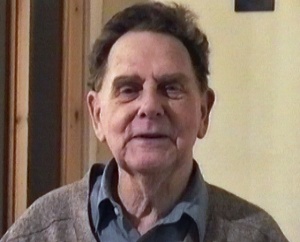
Christmas Day 1996
Talking about Gustav Mahler
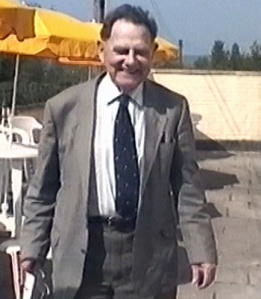
Two months before his death
